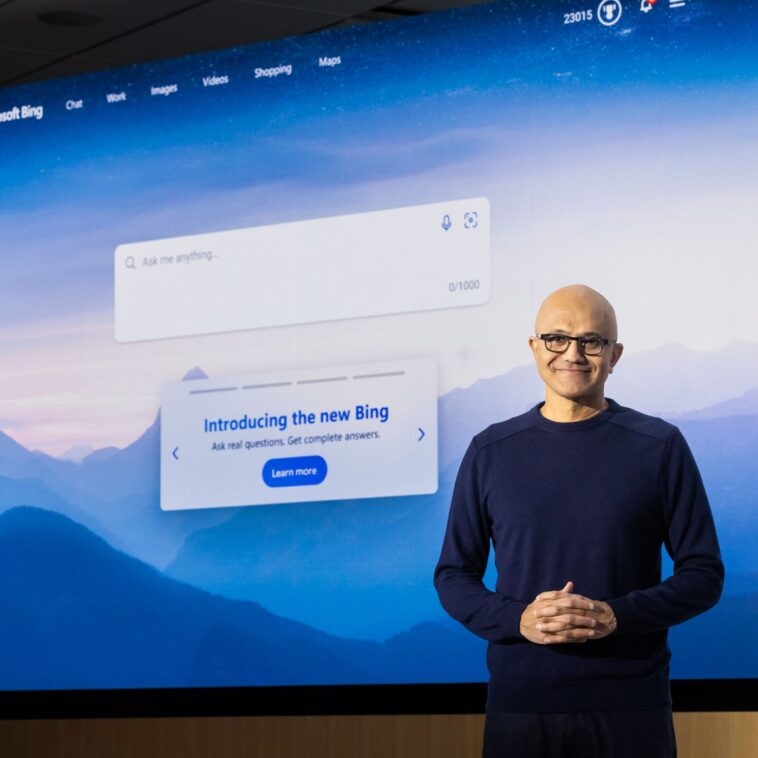Microsoft Bing has a significant issue: Google completely outranks it as a search engine. However, Bing has a potential to stand out more thanks to OpenAI’s language technology, the artificial intelligence platform that has helped the ChatGPT service become a tremendous success.
But Microsoft has to get the specifics perfect for the smarter Bing to function. Although ChatGPT may be helpful, it can also be unreliable, and no one wants a search engine they can’t rely on.
Microsoft has given the problem a lot of attention and invested its own development resources. It has debated topics such as how AI-powered Bing displays adverts, discloses its data sources, and roots the AI technology in reality so you receive reliable results rather than the digital hallucinations that may be difficult to discern in machine-generated information.
To learn more about the updated Bing search engine, I chatted with Jordi Ribas, the director of Bing search and AI. He is such a fan that he employed technology to assist him in writing a note to his supervisor about it. He estimated that it had saved him two to three hours and had also helped the Spanish executive’s English.
Millions of people will be able to search for considerably more intricate information, such as whether an Ikea loveseat can fit in your vehicle, as the technology develops beyond the extremely tiny test group of today. And everyone will be able to see if it really competes with Google. But for the time being, here are seven things I learnt about Bing AI.
Bing AI is more than simply a ChatGPT upgrade.
The huge language model technology from OpenAI, the AI lab that created the ChatGPT tool that has sparked enthusiasm about AI and that Microsoft invested in, is combined with the Bing search engine by Microsoft. Using Bing’s “chat” feature, you may find results similar to ChatGPT, such as “Write a brief essay about the significance of Taoism.” However, for some inquiries, Microsoft’s Prometheus orchestration system combines Bing and OpenAI technologies.
If you enjoy Led Zeppelin, for example, you may Bing “Other artists I should check out.” That prompt is initially changed by OpenAI to “bands like Led Zeppelin,” after which the Bing search results are reorganised into a bulleted list. Each proposal has a two-sentence description, such as Fleetwood Mac, Pink Floyd, or the Rolling Stones.
Bing AI sometimes mentions its sources.
When you ask ChatGPT a question, it will answer with text that it has generated without providing any source information. Although the AI system was trained on a sizable quantity of internet data, it is difficult to directly correlate that training data with ChatGPT’s results.
However, because Bing has access to the source thanks to its online crawling, factual information is often tagged on the search engine. As an example, in the Led Zeppelin challenge above, Bing adds a connection to a Musicaroo post titled 13 Bands That Sound Like Led Zeppelin at the top of its response, along with links to MusicalMum and Producer Hive.
It is easy to determine if an answer is true or just an AI hallucination because to that source openness, which addresses a major critique of AI. However, it doesn’t always show up. For instance, there aren’t any references, footnotes, or links at all in the article on Taoism up top.
Some source links are advertisements that help Microsoft generate money.
The detailed responses from the Bing AI provide Microsoft a new opportunity to make money from adverts. The “organic” search results that Bing determines to be the most relevant in conventional searches are distinct from the things shown by advertisers. However, the two sorts of information may be combined using Bing AI searches.
An illustration of a Bing AI-powered search result that combines information from a website with an advertisement.
The search results on Bing are ad-mixed. In this illustration, a mix of an advertisement and a source for its search results may be seen when the mouse cursor is above the text.
AI-powered Bing, for instance, proposes numerous locations in answer to the query “plan me a one-week vacation to Iceland without a rental vehicle.” One of them has the following text underlined: “Join a multi-day trip or take a bus to explore locations like Vk, Skógafoss, Seljalandsfoss, and Jökulsárlón glacier lagoon.” A tour business advertisement and three sources for the information are shown when you hover over the link. The top item of the three has the designation “ad” and is the advertising.
You should be aware that some of those citations are advertisements, Ribas stated. “When you hover over a question that has a higher purchase intent, a list of references appears, and sometimes an advertisement. Then, sometimes, during the discussion itself, such as when you search for a hotel, you’ll see product advertisements.”
Ad money is important since each upgrade to OpenAI’s language model requires weeks of effort on a massive computer cluster, and according to OpenAI CEO Sam Altman, processing each ChatGPT prompt costs just a few cents. Even while Bing behind Google in the market for search engines, it nevertheless answers millions of searches every day.
Google’s Bard AI chatbot will soon be accessible, but it won’t come with any advertisements at first.
Compared to standard Bing, OpenAI-boosted results are more relevant.
The relevance of a search engine’s results is the key metric for determining how valuable it is, and Microsoft’s evaluation of relevance for its search engine results has been significantly improved using OpenAI technology.
According to Ribas, “my team working really, extremely hard in a given year may improve that statistic by one point,” while OpenAI’s solution increased it by three points in a single stroke. In Bing’s history, Ribas said, “It’s simply never occurred before.”
At the launch of Bing’s AI-powered search engine, Microsoft CEO Satya Nadella gave a speech.
The AI-powered Bing search engine is unveiled by Microsoft CEO Satya Nadella.
According to Ribas, that relevancy bump only applies to regular search results. With its chat interface that provides more in-depth responses and a follow-up interaction, OpenAI’s technology may further enhance Bing.
Bing is improved by OpenAI outside of English.
Searches conducted in languages other than English are one area in which Bing has struggled, and Ribas said that OpenAI can assist. International markets “contributed significantly” to Bing’s three-point increase in relevance rating, according to Ribas.
With text from 100 different languages, OpenAI’s large language model, or LLM, is trained. “My first language is Catalan. I am capable of conversing in Catalan. It performs really well, “Says Ribas
Bing updates the results of OpenAI
Large language models, like OpenAI’s GPT-3.5, the basis for ChatGPT, take a while to develop and enhance, therefore they don’t develop as quickly as the web or traditional search engines. For instance, since GPT-3.5 was developed in 2021, it has no knowledge of events like as Russia’s invasion of Ukraine, the impact of recent inflation on consumers, or Xi Jinping’s election to a third term as general secretary of the Chinese Communist Party.
But often, Bing is aware of this more current information. You will get brand-new results for that whole response when you include the Bing results, according to Ribas.
‘Grounds’ on Bing The extravagant ideas of OpenAI
Microsoft tries to steer clear of scenarios where OpenAI’s more inventive technologies can mislead users using data from Bing. According to Ribas, Bing’s technology is used in the response to a question to a greater extent the more true it is. This “grounding” greatly minimises AI’s issues with fabrication: “It will lessen hallucination, which is… a continual struggle,” stated Ribas.
Microsoft, however, does not want the AI’s magic to be completely eliminated by its grounding method. There’s a good reason why ChatGPT has drawn in so many users. The Prometheus system chooses the order of importance for each question.
Also read:- Who will win the AI chatbot race, Google or Microsoft?
Ribas remarked, “We wanted to strike the right balance between over-grounding the model and keeping it intriguing. “Both the findings’ interest and their groundedness may be quantified. We weight the grounded more heavily when the search is searching for something really factual. The more imaginative the inquiry is intended to be, the less importance we give the grounded. I kept saying to my group, “I want to have my cake and eat it, too.””




